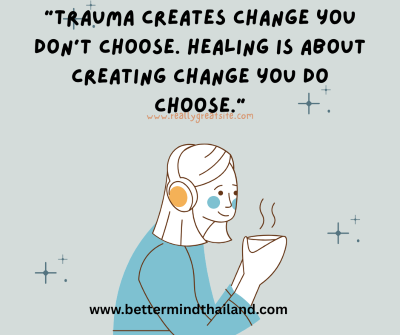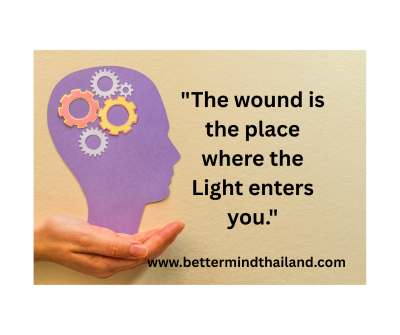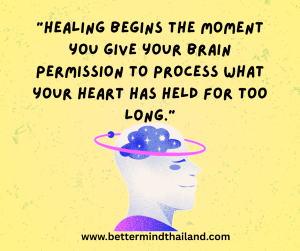What is Trauma? Understanding Emotional Wounds, Causes, and Effective Treatment
918 จำนวนผู้เข้าชม |

What is Trauma?
Understanding Emotional Wounds, Causes, and Effective Treatment

Author: Dr. Marid Kaewchinda (Ph.D) Expertise: Consulting Psychologist, EMDR/Brainspotting Psychotherapy Practitioner
Trauma is the lasting emotional response to a severely distressing event, not just the event itself.
It can lead to chronic psychological and physical health issues, including Post-Traumatic Stress Disorder (PTSD).
Effective treatments include specialized psychotherapies like EMDR Therapy and Brainspotting, in addition to CBT.
What is Psychological Trauma?
The word Trauma refers to a deep emotional wound caused by a severely distressing or life-threatening experience (a traumatic event).
It's crucial to understand that Trauma is not the event; it's the lasting impact on the mind and body. This internal impact remains long after the event has passed, manifesting as persistent fear, anxiety, and a profound sense of unsafety.
Trauma is a natural emotional response to an overwhelmingly negative experience, whether it was experienced directly or witnessed happening to others.
Common Causes of Trauma
Trauma often results from experiences that feel intense, shocking, or leave a person feeling utterly helpless and out of control.
Traumatic events (Traumatic Events) can include:
- Abuse (การถูกทำร้าย): Physical, emotional, or sexual abuse, especially during childhood.
- Accidents & Disasters (อุบัติเหตุและภัยพิบัติ): Severe accidents, natural disasters, or experiencing/witnessing extreme social violence (e.g., war).
- Loss & Grief (การสูญเสีย): Sudden, tragic loss of a loved one.
Violence (ความรุนแรง): Assault, rape, domestic violence, or being bullied/ridiculed. - Neglect (การถูกละเลย): Severe childhood neglect or abandonment.
Note: Individuals react differently to the same event. What causes trauma in one person may not in another, depending on their coping resources and support system.

Recognizing the Symptoms of Trauma
When the mind and body are overwhelmed by a traumatic event, they respond in various ways. Persistent symptoms that suggest the presence of trauma include:
- Intrusive Memories (ความทรงจำที่รบกวน): Recurring nightmares, flashbacks (ภาพย้อนรำลึก), or unwanted thoughts about the event.
- Avoidance (การหลีกเลี่ยง): Actively avoiding people, places, or activities that trigger memories of the trauma.
- Emotional Dysregulation (อารมณ์แปรปรวน): Irritability, outbursts of anger, persistent fear, or feeling emotionally numb/detached.
- Hyperarousal (ภาวะตื่นตัวสูง): Being easily startled, constantly feeling "on edge" (หวาดระแวง), or struggling with insomnia (นอนไม่หลับ).
What is PTSD? (Post-Traumatic Stress Disorder)
If these symptoms persist for a prolonged period (usually more than one month) and severely disrupt daily life, work, or relationships, the person may be diagnosed with Post-Traumatic Stress Disorder (PTSD).
PTSD is a mental health condition that develops following a traumatic event, causing the individual to repeatedly re-experience the trauma through triggers and flashbacks.
The Danger of Untreated Trauma
Leaving Trauma (ปมบาดแผลทางใจ) unaddressed can lead to a significant decline in mental and physical health. The body’s chronic state of stress and fear can contribute to:
- Worsened Mental Health: Increased risk of severe anxiety, panic disorder, depression, bipolar disorder, and other psychiatric illnesses.
- Physical Health Risks: Increased incidence of chronic diseases like heart disease, stroke, diabetes, and certain cancers due to long-term stress hormone imbalance (cortisol and adrenaline).
- Self-Destructive Behavior: Substance abuse (พฤติกรรมเสพติด), self-harm, suicidal ideation, and reckless living.
- Low Self-Esteem: A persistent feeling of worthlessness, shame, or low self-confidence (self-esteem ต่ำ).

Understanding Complex Trauma (Complex PTSD)
Complex Trauma arises from repeated and prolonged traumatic events, such as chronic abuse or neglect during childhood. This type of trauma is harder to resolve and often requires specialized, long-term therapy.
Effective Trauma Treatment and Healing
Trauma is treatable. Healing begins with seeking professional help from a qualified psychologist or psychotherapist.
1. Specialized Psychotherapy (จิตบำบัดเฉพาะทาง)
The most effective treatments focus on helping the brain process and integrate the traumatic memories.
- EMDR Therapy (Eye Movement Desensitization and Reprocessing): A well-researched therapy that uses rhythmic eye movements to help the brain reprocess traumatic memories, significantly reducing their emotional pain.
- Brainspotting (BSP): A newer method that uses specific eye positions (ตำแหน่งการมอง) to locate and access brain regions storing trauma, facilitating emotional release and processing.
- CBT (Cognitive Behavioral Therapy): Helps individuals identify and change the negative thought patterns and behaviors that developed as a result of the trauma.
2. Self-Care and Support (การดูแลตนเอง)
While not a cure, self-care practices support the healing process:
- Mindfulness & Breathing: Practicing deep, controlled breathing and Mindfulness (ฝึกสติ) to regulate the nervous system.
- Exercise: Regular physical activity helps release pent-up stress and emotional energy.
- Social Support: Confiding in trusted friends or support groups.

FAQ (Frequently Asked Questions)
Q1: How is Trauma different from PTSD?
Trauma is the emotional response to a distressing event. PTSD (Post-Traumatic Stress Disorder) is a diagnosable condition that develops when trauma symptoms persist and severely interfere with daily life.
Q2: Can Trauma be fully healed?
Yes, the effects of trauma can be significantly lessened and healed through appropriate therapy, such as specialized psychotherapies like EMDR, Brainspotting, and CBT.
Q3: How long does Trauma treatment take?
The duration varies per individual, depending on the complexity of the trauma and the person's response to therapy. Some may see progress in a few months, while others may require a longer therapeutic journey.
Q4: What are EMDR and Brainspotting?
Both are specialized trauma therapies. EMDR uses rhythmic eye movements to reprocess painful memories, while Brainspotting uses specific eye positions to locate and release trauma stored in the brain.







